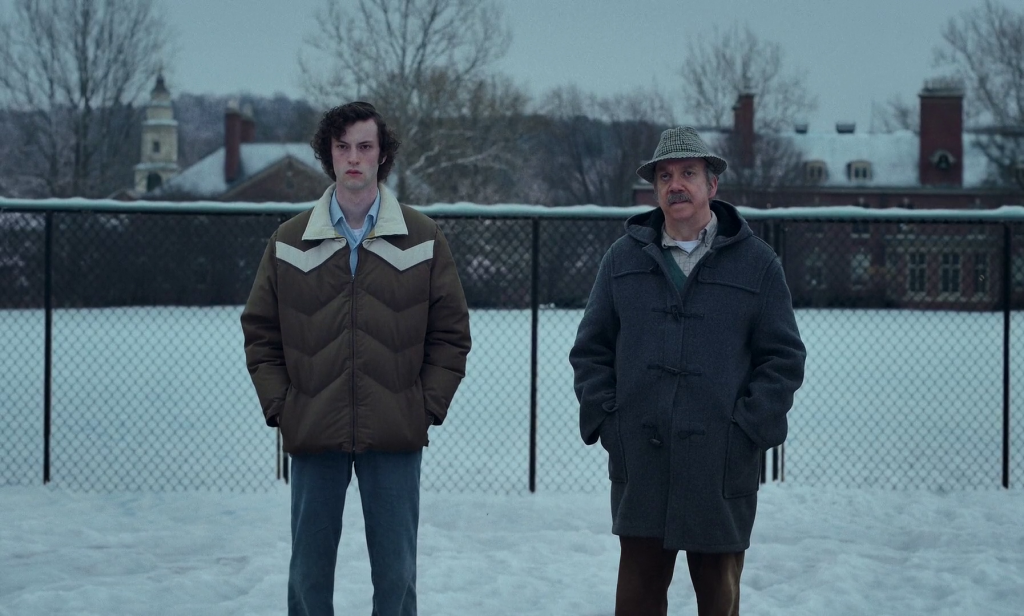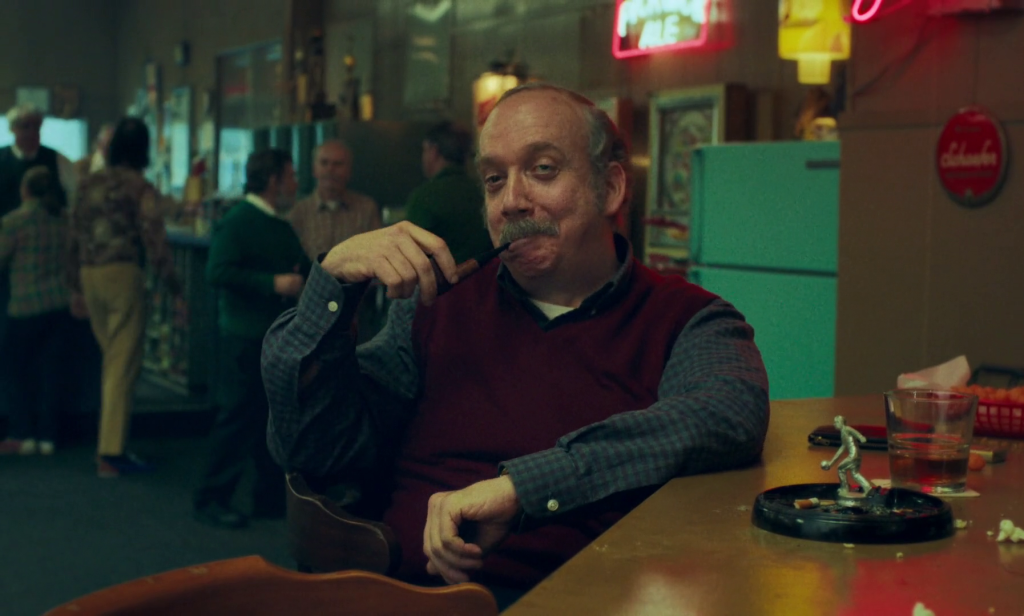If you haven’t heard, Alexander Payne is back with a new film six years after his dismal and critically panned Downsizing. Better yet, Payne is back in full form with his latest movie, The Holdovers, which sees him reunite with his Sideways star and one of our finest living actors – Paul Giamatti.
As the holidays close in on us, consider watching The Holdovers; a truly magical and deeply heartfelt film about loneliness and grief as well as the possibility of starting over. It is, in my opinion, a new Christmas classic.

At a time when crowds storm the theaters in need of action, special effects and also to catch the most prestigious film that will likely go on to win Oscars come February or March of next year, The Holdovers and its relative success in theaters as a small film production prove that people also seek comfort and need movies that tap into the communal experience of Christmas holidays as a turbulent, sometimes difficult time of the year. It is a fascinating amalgamation of our contemporary worries and the long-gone era of 70s filmmaking where misfits, character actors and first timers often replaced the recognizable faces of Hollywood in order to tell extravagant and personal stories.
The Holdovers is set in Barton boarding school, located right outside Boston. The year is 1970 and there’s only a couple of weeks left until the New Year. Think of the opening chapters of Catcher in the Rye with the addition of the looming defeatism brought by the American involvement in Vietnam which at this point was headed into guaranteed doom and failure.
Paul Giamatti plays Barton Professor of Ancient Civilizations, Paul Hunham, also nicknamed “Wall-eyed fuck” by his students, an allusion to his artificial eye; he’s a bitter old goat with the reputation of being the biggest asshole on campus due to his strict teaching practices. He’s also one of the few teachers at Barton who still has a moral compass and some form of backbone which compels him to fail those who deserve it, including the sons of rich businessmen and politicians. This, in turn, puts him on bad terms with the dean of the school and gets him to ultimately have to watch over the few kids that are left stranded in Barton for the duration of the holidays – in other words, the holdovers.

It is a simple set-up. A few days go by and out of the five kids, only one ends up having to remain at the school because his mother can’t be bothered to have him back home as she is busy entertaining her second honeymoon. This kid’s name is Angus (played by an incredible first-time actor in Dominic Sessa) and he’s been kicked out of three schools already despite being one of the smartest students on campus (again, think Catcher in the Rye). If he gets himself in trouble again, he will be shipped off to military academy and then who knows, Vietnam?
The film starts off in this straightforward manner and never attempts to take an abrupt left or right; instead, it steadily pursues its clear path, embracing the beats that such a story – that of the unlikely bond between a grumpy professor and a teenager with a bad attitude – brings to the Christmas table. Add to that the character of Mary Lamb (another wonderful performer in Da’Vine Joy Randolph) – she is the grieving mother of the only Barton student who went off to Vietnam and was killed in action. She works as the school’s cook and spends the evenings sipping hard liquor and watching mind-numbing game shows. Her son wasn’t even 20 when his life was cut short in a foreign land far away from home. Her son also considered Professor Paul Hunham to be “a real asshole.”

By being forced to spend time together, the three characters form a bizarre dynamic that enables them to confront their own personal demons during a period of time that would typically be meant to only reaffirm the positive, cheerful Christmas spirit and the wishes and dreams for the New Year. Instead, like Hunham has done his whole life through his passion and interest in ancient history, our three leads are compelled to wade in their respective past, attempting to make sense of what brought them here in the first place. For Hunham it was the only life he knew – born and raised a Barton man, he never thought of stepping out of the school; Angus, on the other hand, has a tendency to lie his way through anything which may work only to some extent as his family’s past is bound to catch up to him; finally, Mary Lamb is set on not abandoning her son’s memory at a time that requires families to be together by tradition.

In typical Alexander Payne fashion, all of our characters would have the perfect right to wallow in their own misery. Think of Jack Nicholson’s grieving protagonist in About Schmidt who reckons with an unlikely scenario involving his wife and best friend or George Clooney’s in The Descendants who must accept his wife’s infidelity as a tragic accident leaves her in a coma. And yet, in typical Alexander Payne fashion, they don’t. His characters strive to continue pushing through adversity, very often stumbling into awkward, borderline absurd situations that see them become better versions of themselves.

Ultimately, Hunham gives in, and decides to head to Boston with Angus and Mary for an “educational field trip.” It is the most predictable route the movie could take, but it’s precisely this ability of Payne to lean into the cliches and known beats that makes the big revelations in his movies that much more impactful. Because although we know Hunham and Angus will eventually get on the same page and become like father and son to each other, we don’t know how that will come about. And the truth is, neither do they. Hunham has always pushed people away, seeking refuge in his mystery books and his precious knowledge about ancient civilizations. Similarly, Angus has always made it his priority to evade the gaze of others, hiding behind smartass remarks and pranks meant to distract other people’s attention from his own insecurities. “I find the world a bitter and complicated place,” Hunham tells Angus over dinner one night. “And it seems to feel the same way about me. You and I have that in common, I think.”

In the film, Christmas holidays are a reconciliation of one’s own worst fears. Hunham, Angus and Mary Lamb desperately need each other in order not to succumb to the ghosts of the past. Payne understands this and paints each image with a fuzzy, warm feel typical of early 70s movies where even the rough and cold snow-covered streets had a nostalgic look and sound to them. They are the perfect setting for a story about strangers eventually becoming family. There is no Christmas magic involved, it is a movie purely based on human instinct and goodwill.

Giamatti and Sessa work miracles with each other. It is a beautiful pairing of actors who understand not only each other but each other’s characters down to a T. These are real, lived-in performances with real stakes involved. Giamatti – like in Payne’s Oscar-winning Sideways – fights for his character’s sense of dignity in the absurd. He braves through the artificial eye, the off-putting clothing and ticks of Professor Hunham, and manages to turn an asshole into an endearing and warm on-screen presence. Sessa, on the other hand, delivers a masterful debut performance by making Angus a likeable underdog, never falling into the trap of making him seem whiny or repellent despite all the prerequisites for potentially doing so. The duo’s dynamic is one that will stand the test of time like Harold and Maude. It connects the dots between two generations and bridges what some may see as irredeemable differences. They make it work, because both actors understand that each man deserves to have his story told. “The Greeks had the idea that the steps you take to avoid your fate are the very steps that lead you to it. But that’s just a literary conceit. In real life, your history does not have to dictate your destiny. You’re not your father, you’re your own man,” Hunham tells Angus in one of the final scenes of the film.

I longed for a movie like The Holdovers to come along and allow me to embrace it not because of its cinematic merit (which is definitely there), but because of how ‘good’ it feels to have something as pure and comforting to watch on a cold December night. I missed Payne’s movies because they always allow the predictable to become a special event, one to which we’re all invited to, one which we can seek refuge in. The Holdovers is not a Christmas miracle, but a real story about good people.
